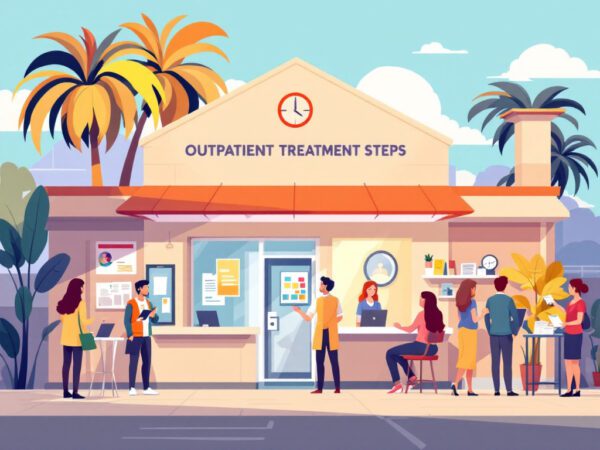Totality Treatment for Drug and Alcohol
Understanding Treatment Options
When seeking treatment for drug and alcohol addiction, understanding the available options is vital for effective recovery. Totality Treatment leverages both detoxification and rehabilitation programs to provide a comprehensive approach to care. We believe that an effective treatment regimen incorporates various components, including outpatient care after detox, which ensures individuals receive the necessary support during their recovery journey.
Outpatient care can be tailored to the specific needs of the individual, which is beneficial after the initial detox process. According to research, continuity in specialty substance abuse treatment after detoxification significantly improves outcomes. In fact, continuity of care within 14 days post-detox predicts a reduction in readmissions and fosters a more stable recovery environment (NCBI).
Importance of Continuity in Treatment
Continuity in treatment following detox is crucial. Timely intervention is associated with various positive outcomes: longer periods of abstinence, fewer legal issues, decreased likelihood of homelessness, and better employment prospects three months after treatment. Unfortunately, only about 25% to 50% of individuals continue treatment after detox, which often leads to relapses and readmissions to detox services.
For many, moving directly into an outpatient program is a viable option that offers flexibility while still providing structured support. Research indicates that outpatient treatment can be just as effective as inpatient care for individuals with mild to moderate withdrawal symptoms, especially when initiated by healthcare providers. This emphasizes the importance of immediate and continued care to enhance the chances of successful recovery.
Totality Treatment’s focus on continuity not only aids in maintaining sobriety but also encourages participants to engage in productive living, such as finding stable employment and avoiding reintegration into harmful environments. Our approach fosters an environment where individuals can thrive during their recovery process, underscoring the significance of consistent support through the transition from detox to outpatient recovery.
Benefits of Outpatient Care
Choosing outpatient care after detox offers several advantages that can greatly benefit individuals on their recovery journey. Here, we will focus on two key benefits: tailored treatment plans and flexibility and convenience.
Tailored Treatment Plans
Outpatient care allows us to create personalized treatment plans that cater to each individual’s unique needs. This approach recognizes that everyone experiences addiction differently and thus requires a specialized path to recovery. According to data from various treatment centers, outpatient programs often last between 3 to 6 months, but they can extend for over a year for more complex cases.
| Treatment Type | Hours per Day | Days per Week |
|---|---|---|
| Partial Hospitalization (PHP) | 5-6 hours | 5-6 days |
| Intensive Outpatient Programming (IOP) | 3 hours | 3-5 days |
With outpatient programs, clients can engage in services like group therapy, methadone maintenance, cognitive behavioral therapy, and addiction education, allowing us to adjust the treatment as progress is made. This flexibility empowers individuals to tackle various aspects of their recovery journey while addressing underlying issues.
Flexibility and Convenience
The convenience of outpatient care cannot be overstated. Patients have the freedom to stay at home or in a sober living environment while still participating in a structured treatment program. This allows them to continue working and maintain connections with family and friends. Many outpatient sessions are scheduled during the evening or early morning, accommodating individuals’ daily responsibilities (Addiction Center).
Additionally, outpatient treatment often incorporates support groups like Alcoholics Anonymous (AA) and Narcotics Anonymous (NA), providing further encouragement and resources that augment individual efforts to maintain sobriety. The ability to access treatment while remaining connected to one’s support system can significantly enhance recovery outcomes.
Overall, outpatient care after detox offers a balanced and supportive approach, allowing individuals to pursue their recovery goals while integrating the necessary support into their daily lives. For more information on different levels of care, explore our resources on outpatient addiction treatment and intensive outpatient programs.
Outpatient Detox Programs
Outpatient detox programs are a crucial step in ensuring a safe and supportive recovery journey for individuals struggling with substance dependence. In this section, we will detail the duration and process of these programs, as well as the role medications play in outpatient detox.
Duration and Process Overview
The duration of outpatient detox programs varies significantly depending on the substance of dependence and individual needs. Typically, these programs last about a week, but they can extend longer for substances such as benzodiazepines and methadone (withdrawal.net). Key factors influencing the detox timeline include the frequency and intensity of substance use, physical dependence, and withdrawal symptom severity.
Here’s a brief overview of what to expect during the outpatient detox process:
| Step | Description |
|---|---|
| Assessment | Initial evaluation to determine the level of dependence and create a personalized treatment plan. |
| Monitoring | Regular physical and mental health check-ups to track progress and response to treatment. |
| Medication Management | Administration of medications to help alleviate withdrawal symptoms and cravings. |
| Counseling | Engagement in therapy and support services to address underlying issues and develop coping strategies. |
| Aftercare Planning | Development of a long-term recovery plan to transition to outpatient treatment after detox. |
Individuals often visit a treatment facility, allowing them to remain in their home environment while receiving help.
Role of Medications in Outpatient Detox
Medications play an essential role in helping individuals manage withdrawal symptoms and cravings during outpatient detox. These medications are tailored to each patient’s specific needs and can significantly reduce the discomfort associated with withdrawal. Common withdrawal symptoms include insomnia, headache, anxiety, and muscle pain, which can be effectively managed through appropriate medication.
Beyond symptom management, outpatient detox programs focus on creating a personalized treatment plan that addresses both physical and mental health. This approach helps set the foundation for long-term recovery post-detox.
In some cases, individuals may require medically supervised detox to ensure their safety, especially if experiencing severe withdrawal symptoms that could be life-threatening (Addiction Center). The combination of individualized care and medical intervention during outpatient detox makes it a flexible and effective option for many seeking recovery.
To explore additional treatment options, consider our offerings such as outpatient addiction treatment or the intensive outpatient program designed to support continued recovery after detox.
Outpatient vs. Inpatient Care
Choosing between outpatient and inpatient care is a significant decision for individuals seeking treatment for drug and alcohol addiction. Understanding the effectiveness and differences between these approaches can help guide us in making an informed choice.
Effectiveness and Comparison
Research indicates that outpatient detox programs can be suitable for patients with mild to moderate substance withdrawal symptoms, often offering more flexibility than residential detox options. In fact, outpatient care has shown commendable outcomes, leading to better detoxification completion and abstinence rates compared to inpatient care in studies involving adults with alcohol dependence. However, no statistical significance was reported in these comparisons.
| Treatment Type | Benefits | Considerations |
|---|---|---|
| Outpatient Care | Flexibility, ability to continue work, family support, lower costs | May not be suitable for severe withdrawal symptoms |
| Inpatient Care | Structured environment, round-the-clock supervision, comprehensive support | Higher cost, potential disruption to daily life |
Outpatient treatment is generally as effective as inpatient treatment for patients with mild to moderate withdrawal symptoms, particularly when initiated in a family physician’s office (Detoxification and Substance Abuse Treatment). This allows individuals to stay at home or in a sober living environment, remaining connected to their support systems.
Considerations for Choosing the Right Treatment
Several factors should be considered when deciding between outpatient and inpatient care.
- Severity of Dependency: Those with severe withdrawal symptoms may require the intensive support available in inpatient settings.
- Support System: Individuals with a strong family or community support network may benefit more from outpatient treatment, allowing them to integrate their recovery into their daily lives.
- Flexibility: Outpatient programs typically offer sessions in the evenings or early mornings, accommodating normal work and family schedules.
- Cost: Outpatient programs are generally more affordable than inpatient programs, making them a more accessible option for some.
Outpatient care often includes components like group therapy, individual counseling, and recovery support options such as Twelve-step groups like Alcoholics Anonymous (AA) or Narcotics Anonymous (NA), which can be critical in maintaining long-term sobriety. For those considering their options following detox, understanding these differences and factors can lead to better outcomes and a more sustainable recovery journey.
By evaluating one’s unique situation and preferences, we can make a more informed decision regarding outpatient care after detox and find the best path to lasting change.
Outpatient Treatment Programs
Outpatient care after detox provides individuals the opportunity to continue their recovery journey while maintaining their daily lives. At Totality Treatment, we offer various outpatient treatment programs that cater to different needs and levels of support.
Levels of Care Offered
In our outpatient programs, we offer two primary levels of care: Partial Hospitalization Programs (PHP) and Intensive Outpatient Programming (IOP).
| Level of Care | Description | Frequency | Duration |
|---|---|---|---|
| Partial Hospitalization Program (PHP) | Involves 5-6 hours of treatment daily, focusing on stabilizing behaviors in early recovery | 5-6 days a week | Typically lasts 3 to 6 months initially but can extend depending on individual needs |
| Intensive Outpatient Program (IOP) | Comprises 3 hours of treatment daily and allows individuals to gradually return to their daily routines | 3-5 days a week | Similar duration to PHP; can also extend for more serious cases |
Outpatient treatment allows individuals to retain their living environments, which is vital for long-term recovery. By participating in outpatient addiction treatment, individuals can remain connected to their support systems while receiving necessary therapeutic interventions.
Components of Outpatient Rehab
The outpatient rehab programs we provide at Totality Treatment include essential components designed to support long-term sobriety:
- Individual and Group Counseling: One-on-one sessions with licensed therapists, as well as group meetings to share experiences and insights.
- Psychoeducation: Educational sessions focusing on addiction, recovery strategies, and coping mechanisms essential for maintaining sobriety.
- Relapse Prevention Strategies: Techniques and tools aimed at preventing relapse and responding to triggers effectively.
- Supportive Meetings: Participation in groups such as Alcoholics Anonymous (AA) and Narcotics Anonymous (NA) as an integral part of the recovery process.
According to studies, outpatient treatment can lead to better detoxification and abstinence rates compared to inpatient care for adults with alcohol dependence, while also offering manageable safety outcomes.
Opting for outpatient care facilitates a flexible and supportive recovery process that can effectively cater to individual circumstances and foster a lasting change. For specific programs like our intensive outpatient program or partial hospitalization program, we invite you to explore further options that best fit your recovery journey.
Factors to Consider
Choosing the right treatment option after detox is crucial for a successful recovery. In this section, we will explore two significant factors: cost and duration, as well as the importance of making an informed decision.
Cost and Duration
The cost of outpatient treatment is generally lower than that of inpatient programs. This cost difference is primarily due to the absence of 24/7 medical care and continuous psychotherapy that are commonly provided in residential facilities (Addiction Center). However, cost should not be the sole factor in making a decision. It’s essential for us to evaluate all aspects of our treatment journey, including the specific needs and recovery goals.
Here is a general comparison of costs for different treatment settings:
| Treatment Type | Average Cost per Week | Average Duration |
|---|---|---|
| Outpatient Treatment | $500 – $1,000 | Varies (weeks to months) |
| Inpatient Treatment | $1,000 – $2,500 | 30 days – 90 days |
Duration of treatment can also vary widely based on the individual’s needs. While outpatient care typically allows for more flexibility, the commitment might last several weeks to months. Outpatient detox programs provide the advantage of seeking treatment while still managing personal life and responsibilities, as patients can reside at home and visit the detox center weekly (withdrawal.net).
Making an Informed Decision
When considering outpatient care after detox, it is important to make an informed decision regarding treatment options. We should weigh the pros and cons of outpatient versus inpatient care, considering our unique circumstances and recovery needs. Although some studies indicate outpatient programs lead to better detoxification completion rates and abstinence compared to inpatient programs, statistical significance was not always achieved.
In addition, evidence-based guidelines suggest that outpatient settings may be safer for managing withdrawal in patients with opioid use disorder (NCBI Bookshelf). It is crucial to choose a program that aligns with our personal preferences, lifestyle, and the level of support needed during recovery.
We encourage individuals to discuss their options with healthcare providers and explore various programs to find the best fit. Various outpatient options, such as the individualized intensive program or hybrid outpatient program, can offer tailored approaches that may better accommodate their recovery needs. By thoroughly evaluating the factors of cost, duration, and the specific components of available programs, we can empower ourselves and our loved ones to make a choice that promotes lasting change.















